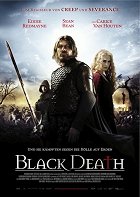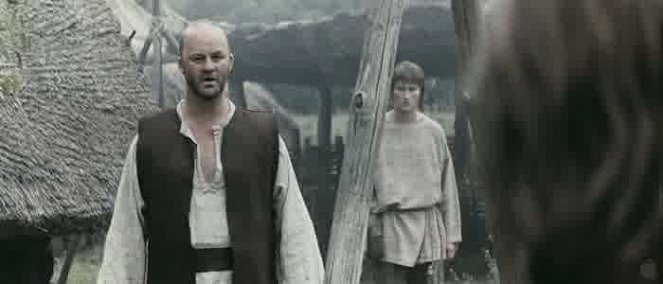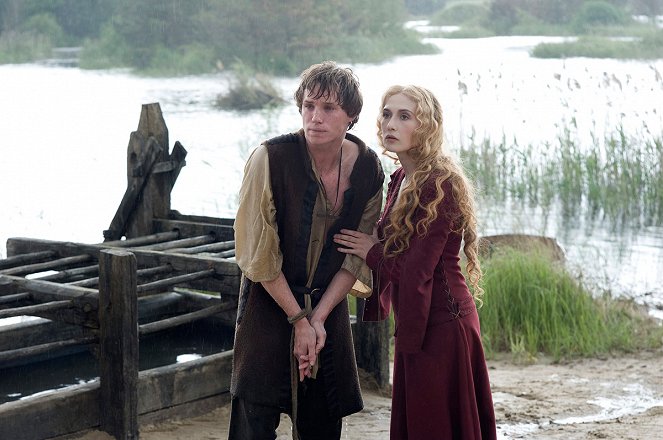Rendező:
Christopher SmithForgatókönyvíró:
Dario PoloniOperatőr:
Sebastian EdschmidZeneszerző:
Christian HensonSzereplők:
Eddie Redmayne, Sean Bean, Carice van Houten, David Warner, Kimberley Nixon, John Lynch, Tim McInnerny, Andy Nyman, Emun Elliott, Tygo Gernandt (több)Tartalmak(1)
1348-at írunk, mikor Európára a pestis rémisztő és pusztító árnyéka vetül. Miközben a fekete halál tizedeli a lakosságot, félelem szülte babonás történetek terjednek az emberek között. Az egyik szerint van egy rejtett falu, hol a pestis nem szedi áldozatait: egy szellemidéző vissza tudja hozni a holtakat az élők közé. Ulric (Sean Bean – A gyűrűk ura, A trónok harca) rettegett lovag. Az egyház őt kéri fel, hogy derítse ki az igazságot a faluval kapcsolatban. Csatlakozik hozzá egy fiatal szerzetes és néhány katona is, ám az utazók legmélyebb rémálmaikban sem találkozhatnának azzal a borzalommal, amely a faluban vár rájuk... (ADS Service)
(több)Videók (1)
Recenziók (8)
I kept waiting for the sweet tremor between faith and disbelief, between dogma and heresy, to fade away into some stupid horror cliché, and I'm pleasantly shocked that it didn't. The script does the most sensible thing with all the key characters - it lets them stray into the mists of their delusions and obsessions (i.e., from a narrative point of view, common sense prevails). Smith already amazed me because he doesn't want to get the viewer drunk on the designs, but by modern means he pushes him right into the middle of the world crawling with sores - very reminiscent of HBO's historical production. The very solid acting performances are underlined by adequately dramatic music. It has to be said that I am still processing the whole thing, but if I take away a few of the wooden moments, the film is a well thought-out and well-realized variation on all other variations of Conrad's book “Heart of Darkness". Even the stuffing of the Middle Ages with very modern thought content didn't bother me very much. A strong ****.
()
In terms of the genre, it is definitely an above-average film, and I can imagine that a similar story could be made in a much worse way. However, this film doesn't completely sit well with me. Nevertheless, my reservations will not be felt by most film fans. Essentially, they are aimed at whether you like the literary works of Dan Brown or Umberto Eco. Both write seemingly the same thing, but upon closer inspection, there is a fundamental difference between them. Umberto Eco writes with top-notch knowledge of history, aesthetics, and contemporary philosophy, so he places his characters and their destinies in a flawlessly historically accurate environment. On the other hand, Dan Brown writes his adventure stories with the knowledge that the historical reality is unimportant to the overwhelming majority of readers, so he throws it together somewhat haphazardly, and his books do not hold up under closer analysis. Of course, this doesn't matter to him in terms of achieving greater commercial success. Black Death functions as an adventurous and mysterious story, where the viewer can admire the dark atmosphere of a country ravaged by a devastating epidemic and the clash of religious values. Deep forests, bandits, and their bloody clash with an expedition, marshes engulfed in mist, and a mysterious village where witches rampage - all of these are genre props skillfully utilized, and together with solid casting, create a solid impression on the viewer. However, as a historical story, it does not hold up, because the conflict between Christianity and paganism was fought out centuries before, and Christianity successfully assimilated popular superstition and various cults. Individual religious heresies and conflicts occurred at a different level, but that is not essential for the average film fan. Rather, I am referring to those screenplay somersaults, such as when in a hopeless situation, two exhausted captive mercenaries, weakened by torture, suddenly free themselves from bondage and within a moment break the resistance of an entire rebellious village. Nevertheless, Black Death earns a solid overall impression of 60% from me.
()
Solomon Kane meets The Wicker Man. The film is a thoughtful look at militant faith, fanatical atheism, and man's ability to believe without limits in everything he cannot explain. Sometimes you can't do anything else, but everything has its limits. It’s all set in the dirty Middle Ages where fights with the fist and sword are commonplace, so we see plenty of limbs rolling around in the mud. It's not a horror film in the slightest, but it is thought-provokingly rich. 4 ½.
()
Creatively distinctive, atypical and exceptionally dark, with its grey tones and unflagging mysterious mood, it strongly evokes Annaud's classic The Name of the Rose. Except Sean Bean and co. swing their swords a bit more and now and then someone loses an arm, a leg or a head. It’s not a wild bestial ride, or horror, it oscillates interestingly in its (anti)religious themes, because each of the main characters expresses a point of view and at the same time all of them are essentially negative. This is a purely individualistic and thematically quite proficient film about Christianity and paganism, where it is impossible to clearly define the winner and the right path. With a more renowned director it might have been even bigger and more impressive, but those ambitions were clearly absent , this was supposed to be a small, intimate film. And it's pretty clear where the casting directors drew inspiration for GoT, Carice van Houten is amazing and Bean, well, he’s as good as always.
()
So far, Christopher Smith had pleasantly surprised with each of his films (Creep, Severance, Triangle), so I was very much looking forward to Black Death, even if historical horror is not quite my cup of tea. I thought that Smith would conjure a properly dark atmosphere, demonic witches, filthy peasants killed by the plague, a couple of nice scenes in a swamp and a deep forest, and that I would be satisfied. Unfortunately, I’m not. Black Death is a very intimate film shot in a documentary style, which isn’t the most fortunate choice for the theme. Horror set in the middle ages should have slow camera movements, dark filters and weak lightning with candles, and not a frantic cameraman in action mostly in daylight. Moreover, the story is tragically empty, the first half wasn’t fun at all, the second half was a little better, but nothing to write home about. There are about two scenes where the film shows its true potential; unfortunately, it failed to exploit it. Edit after a rewatch due to several reviews that convinced me that I must have missed some sign of “genius”. The result? The mild dissatisfaction remains, but I’m no longer disappointed (i.e. I’m adding one star). The “intellectual message” (yeah, I’m being a little snarky) is nice, but also very plain. I think this is one of those films where the debates around it are more interesting than the film itself. Anyone who wants to love Black Death will love it, anyone who wants to find something groundbreaking in it, will find it, but by their own fault, rather. I still have the impression of a documentary about a LARP game (intentional, to be fair).
()



Hirdetés